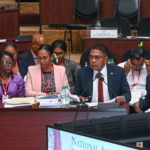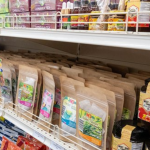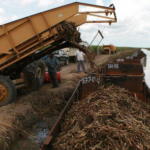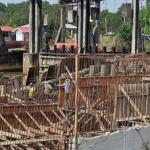The introduction of brackish water shrimp production, which is one of the measures the government has been pushing, is advancing well in Region Six. This measure was taken due to the worldwide issue of low fish catches that have impacted the local fisheries industry.
His Excellency, Dr. Mohamed Irfaan Ali has said aquaculture is a very important component of the agriculture sector, which will never fail under the PPP/C Government. Aquaculture refers to the rearing, breeding and harvesting of aquatic species, both animals and plants, in environments such as oceans, lakes, rivers, ponds and streams.
At Plantation Bowlan, Erwin Abdulla praised the initiative, citing that it has the potential to stimulate economic growth, specifically for export and food sustainability.
“Right now, we have four ponds completed and we still have 10 more to complete under this first phase of development of the semi-intensive system. We are now producing close to four times what we used to produce. When those other 10 ponds are finished, we should be producing like 60 tons of shrimp or more,” Abdulla told DPI.
He believes that the project is beyond rearing of shrimps, explaining that the new venture has already created a number of job opportunities.
“We have over 24 people employed on this part of the project and by the time we are in full production, we would be employing probably 50 or more. We are in a process right now of establishing a security firm because stealing is a very challenging thing that we face and now with intensive aquaculture, we will be having much more shrimp, the inducive for people to come and steal will be much greater.”
He added, “the turnaround time to clean the ponds to get all the predators out was very long, but with the initiative by the government, clearing of the sand bank by the pontoon, digging the outfall drains and drainage system, helping us with tubes, have seen our production in this particular farm multiplying four times.”
Like Abdulla, Chairman of the East Berbice Corentyne Aquaculture Cooperative Society Limited, Suedat Persaud, anticipates the region’s shrimp production accelerating up to 450,000 tons per year.
“This initiative has improved the aquaculture sector to where we could actually now take three times the volume of water, and this volume of water will assist in the el nino period where the heat will not affect the shrimps and the fish. And even in the la nina period, the flooding, we have high dams that can combat flooding now,” fisherman Persaud explained.
Persaud also boasted about the upgraded drainage and irrigation systems. “…what has also happened, we received pipes and installed them. The drainage has improved and the overall aquaculture sector has improved in Region Six.”
Balwant Singh is another farmer benefitting from the first ever government sponsored shrimp production in the ancient county.
Just off the Berbice River Bridge at Fortlands East Canje, the budding agriculturist operates four shrimp ponds, all measuring at least three acres.
“This project started last year July and this is because of the government. They actually reach out to shrimp farmers and was offering help to make our farm sustainable and to assist in the community. On this farm we will be hiring a few people after it gets off its leg,” Singh underscored.
The preparation phase of the project was successful, he explained, as he credited the expertise and guidance of the fisheries department. Singh would visit his farm on a daily basis to monitor the production, ensuring there is no leakage of water.
And while he is excited about expanding his production, “…I have never done this before, I am doing it because of their assistance. After this, I would know how to proceed and expand. Right now, we have shrimp in here and I am sure that we will do good because I have seen a lot of fingerlings came in.”
He highly anticipates the harvesting phase within the next four to six weeks.
Since taking office on August 2, 2020, the administration has been paying significant attention to the nation’s fisheries sector, to ensure the livelihood of fisherfolk is maintained.
More than $743.7 million was allocated to advance the fisheries and aquaculture sub sector and ensure continued development of the industry this year.
Some $230 million has been committed to rehabilitate an additional 63 shrimp farms this year. This is expected to increase production to 500,000 kilograms per year, with an estimated value of over $300 million per annum.
The shrimp production is a major contributor to food security and livelihoods in Region Six. The industry has significant potential to be upgraded to produce over 300 per cent of its current production.
Meanwhile, the PPP/C Government will continue the momentum of expanding the fisheries industry. It has committed an additional $200 million to initiate the culture to develop marine cage fish farming in Guyana.
This is expected to benefit over 135 persons, including hinterland communities, fish farmers, and particularly fishermen who are seeking alternative means of earning.
The Head of State said the project guarantees fisherfolk close to $8 million annually.
“…and when you examine the numbers, each one of those marine cages can bring in a net value of close to $8 million annually. And you could pay back for the investments within six months,” Dr. Ali explained.
The cage culture project will be rolled out in two phases. First, the installation of cages to rear the fish, and second, the construction of a hatchery and feed facility to support further development.
It is expected to enhance fish production by over 100,000 kilograms of fish per annum.
Agriculture Minister, Zulfikar Mustapha, M.P, will soon host consultations with fisherfolk about the new plan. Already, fishing inputs are no longer subject to VAT. Fishermen are once again able to purchase equipment and secure licences without having to pay high fees to conduct their businesses.












